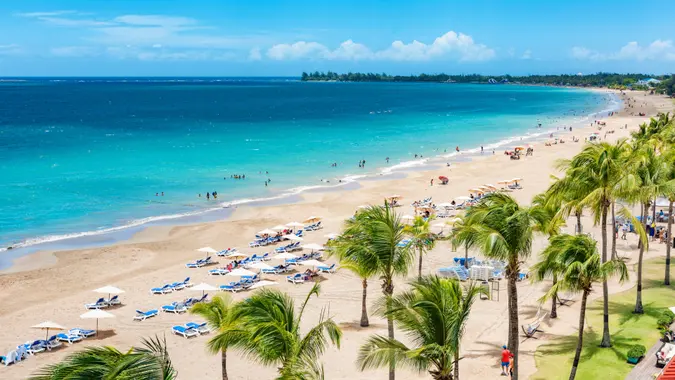8 Key Signs a Staycation Is the Smartest Move in a High-Tariff Economy

Commitment to Our Readers
GOBankingRates' editorial team is committed to bringing you unbiased reviews and information. We use data-driven methodologies to evaluate financial products and services - our reviews and ratings are not influenced by advertisers. You can read more about our editorial guidelines and our products and services review methodology.

20 Years
Helping You Live Richer

Reviewed
by Experts

Trusted by
Millions of Readers
With summer just around the corner, vacation planning may already be top of your mind. However, rising tariffs could affect more than just the cost of goods — they can also increase the prices of fuel, transportation and even lodging, as businesses adjust rates to cover their higher expenses.
If higher costs have you reconsidering travel plans, you might be thinking about opting for a staycation instead, whether it’s camping at a nearby national park or simply relaxing at home. But how do you know if staying put is truly your best option?
Experts weigh in with some key signs that choosing a staycation makes the most financial sense during a high-tariff economy.
You Keep Downgrading a Trip
One of the clearest signs that you may not be able to afford the vacation you really want is if you start “stripping away the experiences that make it truly memorable, like downgrading flights or staying far from the action just to make it work,” according to Duncan Greenfield-Turk, founder of Global Travel Moments.
At that point, a staycation might actually bring more joy and save you money.
You’re Trying To Save for Something Big
Another key sign that you might want to stay close to home is if you’re saving for something major like a new house, car, major appliance or something else.
“Pressing pause on travel doesn’t mean sacrificing rest,” Greenfield-Turk said. In fact, a well-planned staycation can deliver the same emotional payoff without the financial strain.
Prices Keep Going Up
If you’ve been monitoring the prices of travel for your planned destination, like airline ticket costs and hotel prices, and those prices seem to be increasing pretty consistently, that may be a sign to either book now before things get too expensive or to postpone your trip at least temporarily, according to Steve Schwab, CEO of Casago.
“Make sure you know exactly what your travel budget is and that you use that as a guide to figure out what your best move is,” he urged.
Also, keep in mind that certain elements of travel may be more impacted by tariffs than others. “Hotels, for example, often buy tons of imported products that they replace daily, whereas privately owned vacation rentals may not be dealing with tariff-related price hikes very much at all,” he said.
With hotel and airfare prices rising by as much as 30% to 40% in some cases, Greenfield-Turk said, if that price no longer matches the value of your intended vacation, it might not be the right time to travel. You don’t want to feel like you spent a lot of money but didn’t get an equivalent experience.
Planning Feels Stressful
If planning a trip feels more stressful than exciting because of financial worries, that’s your cue to stay home, Greenfield-Turk said. When uncertainty is high, staycations offer the freedom to relax without the anxiety of overspending
If you’re also lucky to live near stunning natural beauty, or have access to meaningful experiences like seasonal or cultural events, a staycation may just make the most sense.
Your Travel Budget Is Maxed
If your expected travel costs are at your max budget before tariffs kick in, you’re likely going to overspend, according to Melanie Musson, a finance expert with Clearsurance.com.
“Everything from hotels to food costs more this year than in the past, so if a conservative budget is a stretch for your finances, you’ll probably overspend and go into debt.”
You Don’t Have Enough Saved
Additionally, if you haven’t been saving up for your trip, it’s almost a guarantee that you’ll overspend, Musson said.
“The cost of vacation outweighs the benefits when you haven’t been able to save for it.”
Overspending often leads to using credit cards, as well. If the costs of daily life have increased so much that you’re unable to financially prepare for a trip, any type of travel is likely to increase your debt, Musson said.
You’re Already in Debt
If you’re already carrying a significant amount of debt, and your trip is likely to add to that or eat up funds earmarked for paying that down, you won’t get much benefit from a relaxing vacation if you’re just coming home to more debt, Musson pointed out.
If you can continue to pay down your debt and travel without increasing your debt, you should take your trip, she said.
Your Job or Income Is Uncertain
Lastly, if you face the possibility or probability of being furloughed or losing your job, or you depend upon an inconsistent income, such as freelance or consulting gig work, you may want to prioritize an emergency fund over a vacation until you can be sure of your job or income security, Musson said.
The best vacations are ones that bring relaxation, not financial stress. If high tariffs and rising costs threaten to disrupt your finances, choosing a staycation can be both financially wise and personally rewarding.
More From GOBankingRates
Sources
- Duncan Greenfield-Turk, Global Travel Moments
- Steve Schwab, Casago
- Melanie Musson, Clearsurance.com
 Written by
Written by  Edited by
Edited by 

























